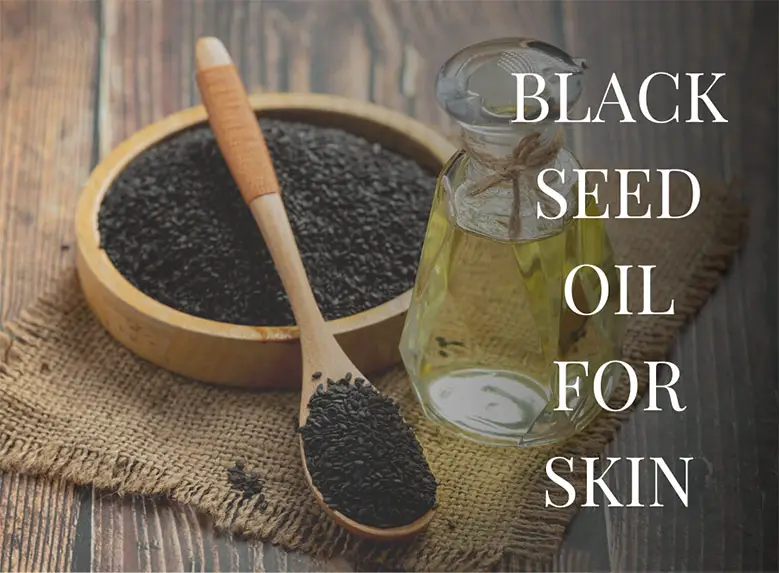
Black seed oil has gained popularity over the years and might be the natural oil that your skin – and face – needs. While it’s renowned for its therapeutic properties, including combating cancer and supporting liver function, its benefits for skincare are equally compelling.
In this ultimate guide, we’ll explore the benefits of black seed oil for your skin. From acne to aging, find out how this simple oil can improve your skincare routine.
Table of Contents
- What is Black Seed Oil?
- Benefits of Black Seed Oil for Skin
- Benefits of Black Seed Oil for Acne and Acne Scars
- How Black Seed Oil Works for Other Skin Diseases
- Black Seed Oil for Skin Hyperpigmentation
- Can Black Seed Oil Alleviate Skin Allergies and Irritations?
- Black Seed Oil for Skin Tightening and Aging
- Additional Benefits of Black Seed Oil for Skin
- Is Black Seed Oil Good for your skin type?
- How to Use Black Seed Oil for Skin
- FAQ
What is Black Seed Oil?
Also known as kalonji oil or black onion seed oil, black seed oil boasts a rich history that spans over 3,000 years. Originating in Southwest Asia, it has been widely used in traditional medicine for its multitude of health benefits.
When it comes to skincare, the terms ‘black seed oil’ and ‘black cumin seed oil’ are often used interchangeably. However, it’s important to note that these oils are not the same. Black seed oil is derived from the seeds of the Nigella Sativa plant, while black cumin seed oil comes from the seeds of a different plant, Bunium bulbocastanum.
Because these two oils offer distinct skin benefits, it’s crucial to read the label carefully. Make sure you are purchasing the correct black seed oil, specifically from the Nigella Sativa plant, to get the benefits you’re seeking.
Benefits of Black Seed Oil for Skin
The unique properties of black seed oil provide a comprehensive range of benefits that target various skin concerns:
Antioxidant Benefits
One of the standout benefits of black seed oil lies in its potent antioxidant profile, with thymoquinone being a key player. This compound, found in abundance in the oil, is known for its powerful antioxidant properties.
Antioxidants are essential in neutralizing skin-damaging free radicals, which contribute to premature aging and cellular damage. By effectively combating these free radicals, black seed oil not only helps to maintain skin elasticity but also minimizes the visibility of fine lines and wrinkles. Scientific research supports the efficacy of thymoquinone as a powerful antioxidant.
Anti-Inflammatory Effects
Black seed oil is also celebrated for its anti-inflammatory properties. Inflammation is often the root cause of various skin conditions, including acne, eczema, and rosacea. The oil works by soothing the skin, reducing redness, and targeting inflammation at the cellular level.
These anti-inflammatory benefits are not just anecdotal; they’re backed by scientific research, making black seed oil a reliable choice for managing skin conditions associated with inflammation, such as acne, eczema, and psoriasis.
Antibacterial Properties
The antibacterial qualities of black seed oil add another layer to its versatile skin care applications. These properties make it effective in treating minor cuts, scrapes, and bacterial skin infections. They’re especially potent against acne, helping to eliminate the bacteria often responsible for breakouts. This antibacterial efficacy is supported by multiple scientific studies.
Antifungal Benefits
In addition to its antibacterial effectiveness, black seed oil also offers antifungal properties. This makes it useful in treating conditions like athlete’s foot, ringworm, and other fungal skin infections. The antifungal capabilities of black seed oil have been validated through academic research, further solidifying its place as a versatile skin treatment.
Benefits of Black Seed Oil for Acne and Acne Scars
Among its myriad skin benefits, black seed oil shows particular promise in the treatment of acne and acne scars, offering natural solutions backed by scientific research.
Black Seed Oil for Acne
Black seed oil offers a natural and effective solution for tackling acne, primarily due to its antibacterial and anti-inflammatory properties. Acne is often triggered by bacteria, specifically Propionibacterium acnes. Here, black seed oil shines with its ability to not just kill surface bacteria but also penetrate the pores for a deeper effect.
Its anti-inflammatory properties further help in reducing redness and swelling—common issues associated with acne. This two-pronged approach makes black seed oil a compelling option for acne treatment.
A study even revealed that a 20% black seed oil lotion was more effective against mild and moderate acne than a 5% benzoyl peroxide lotion.
Black Seed Oil for Acne Scars
If you have acne scars, black seed oil can also help. It has antioxidants like thymoquinone that aid in skin regeneration and speed up the healing process. This is particularly useful for lightening dark spots left by acne.
The oil also has anti-inflammatory properties that make raised scars less visible. Multiple studies support these healing benefits of black seed oil.
How Black Seed Oil Works for Other Skin Diseases
If you’re struggling with other skin issues beyond acne and scarring, black seed oil may be your versatile go-to solution. Here’s how it works for different skin conditions:
Black Seed Oil for Eczema
Eczema often disrupts the skin’s natural moisture barrier, resulting in red, itchy skin largely due to inflammation. Black seed oil’s anti-inflammatory ingredients, especially thymoquinone, target this inflammation, offering quick relief.
The oil also acts as a moisturizer, sealing in hydration and nourishing your skin. This is essential for preventing further irritation and dryness, common problems for those dealing with eczema. Studies back up these anti-inflammatory and moisturizing benefits.
Black Seed Oil for Psoriasis
Psoriasis is characterized by the rapid buildup of skin cells, resulting in scaly patches. The antioxidants in black seed oil promote the healthy turnover of skin cells, aiding in the natural shedding process and reducing the severity of psoriatic patches. Its anti-inflammatory attributes also help to reduce thickness, redness, and scaling.
A 2017 study suggests that black seed oil could offer therapeutic benefits for psoriasis patients, especially when used alongside conventional treatments.
Black Seed Oil for Skin Fungus
When it comes to fungal skin infections like athlete’s foot or ringworm, black seed oil offers a promising solution thanks to its antifungal properties.
Unlike some antifungal agents that work only on specific strains, black seed oil has a broad-spectrum antifungal effect. This makes it a versatile option for various types of fungal skin infections.
Academic research has shown that the antifungal properties of black seed oil are effective against several different strains of fungi, further confirming its usefulness in combating skin fungus.
Black Seed Oil for Skin Hyperpigmentation
Black seed oil has gained attention for its potential to regulate melanin, the pigment that gives skin its color. Imbalances in melanin can lead to issues like hyperpigmentation, where patches of skin darken. The antioxidant thymoquinone in black seed oil may help control melanin production and lighten these patches. By reducing oxidative stress and inflammation on the skin, it could indirectly contribute to lightening these darker patches.
However, it’s important to note that current scientific evidence specifically supporting black seed oil for skin lightening is limited; most claims are anecdotal and require further research.
Can Black Seed Oil Alleviate Skin Allergies and Irritations?
Anti-inflammatory and Antihistamine properties
Black seed oil is often recommended for skin allergies and irritations, primarily due to its potent anti-inflammatory and antihistamine attributes. Skin allergies often manifest as red, inflamed patches that itch or burn. The anti-inflammatory compounds in black seed oil, such as thymoquinone, can help soothe these symptoms.
The oil’s antihistamine properties also help control allergic reactions by blocking the release of histamine, providing additional relief.
Soothing Effects
Beyond its benefits for allergies, black seed oil can also address general skin irritations like rashes or minor burns. Its calming effects help to quickly settle the skin, accelerating the overall healing process.
Antimicrobial Action
If skin irritations are left untreated, they can potentially develop into infections. Black seed oil’s antimicrobial qualities form a protective barrier against bacteria and fungi, thus reducing the likelihood of infection.
Black Seed Oil for Skin Tightening and Aging
Black seed oil presents a holistic approach to combating skin aging, offering benefits from antioxidant protection to collagen renewal:
- Antioxidant Action: The antioxidant-rich thymoquinone in black seed oil fights free radicals, helping to maintain skin elasticity and a youthful appearance.
- Boosts Collagen: Black seed oil not only aids in the production of collagen, a vital protein for skin structure, but it also addresses the decline in collagen levels that contribute to sagging skin. Nutrients in the oil have been suggested in some studies to enhance collagen production, giving the skin a plumper and more youthful appearance.
- Deep Moisturization: Black seed oil serves as an emollient, delivering deep hydration to the skin. This moisture-rich environment helps smooth out fine lines and wrinkles. Additionally, well-moisturized skin gains a natural plumpness, contributing to an overall more youthful appearance.
Though specific studies directly linking black seed oil to skin tightening are limited, its well-researched antioxidant and anti-inflammatory properties suggest a potential role in combating skin aging.
Additional Benefits of Black Seed Oil for Skin
Aloe Vera and Black Seed Oil for Skin
Combining aloe vera with black seed oil creates a skincare powerhouse that capitalizes on the benefits of both ingredients. Aloe vera is famous for its hydrating and soothing properties, while black seed oil brings its antioxidant and anti-inflammatory benefits to the table. Used together, they offer deep skin hydration, combat aging signs, and ease irritations—making this combination particularly good for dry or sensitive skin.
Benefits of Black Seed Soap
Black seed soap offers a convenient way to incorporate black seed oil into your daily skincare routine. These soaps are usually rich in antioxidants and have antibacterial effects, which help cleanse the skin, remove impurities, and combat acne-causing bacteria. Plus, the moisturizing capabilities of the oil will leave your skin feeling soft and well-nourished.
Drinking Black Seed Oil for Skin
While there’s no scientific evidence to definitively say that drinking black seed oil improves your skin, some believe it might. The idea is that taking it internally could provide a comprehensive approach to skin health, working from the inside out to provide an array of nutrients. This may help improve skin elasticity, reduce inflammation, and combat acne from within.
However, it’s crucial to consult a doctor before adding black seed oil to your diet, especially if you’re pregnant or taking medication.
Is Black Seed Oil Good for your skin type?
Black Seed Oil for Dry Skin
If you have dry skin, black seed oil might be a helpful addition to your skincare routine. Its emollient properties not only hydrate the skin but also lock in that moisture, helping to alleviate the uncomfortable tightness and flaky texture commonly seen in dry skin types.
Black Seed Oil for Oily Skin
It might seem counterintuitive, but black seed oil can also work wonders for oily skin. The oil has the unique ability to balance the skin’s natural oil (sebum) production. As a result, it can reduce excess oiliness without leaving your skin dried out.
Black Seed Oil for Acne-Prone Skin
If you’re dealing with acne, black seed oil has properties that can help. It contains antimicrobial agents that fight acne-causing bacteria, as well as anti-inflammatory compounds that can reduce redness and swelling, making it a good match for acne-prone skin.
Black Seed Oil for Sensitive Skin
For those with sensitive skin, a bit of caution is advised. Although black seed oil offers various skincare benefits, it also contains volatile fragrance compounds that may irritate sensitive skin. To be on the safe side, it’s best to perform a patch test before applying the oil to larger areas of your skin.
How to Use Black Seed Oil for Skin
Application Methods for Facial Care
When using black seed oil on your face, you have a couple of options. You can either apply a few drops directly onto your skin or mix it into your usual moisturizer. For better absorption and improved circulation, apply using upward circular motions.
Using Black Seed Oil for Skin Tone Improvement
If you’re looking to even out your skin tone or address hyperpigmentation, try blending black seed oil with a Vitamin C serum. Apply this mixture in the evening and rinse it off in the morning. You can also explore products specifically designed for hyperpigmentation that include black seed oil and other active ingredients that inhibit melanin production.
Overnight Facial Treatment with Black Seed Oil
Thinking of leaving black seed oil on your face overnight? Make sure to do a patch test beforehand to check for any skin irritations. If the test is successful, apply a thin layer of the oil before bedtime. This allows for maximum absorption and offers enhanced skincare benefits.
Tips for Achieving Radiant Skin
For a radiant complexion, consider combining black seed oil with other nourishing oils like rosehip or argan oil. This powerful blend can be used a few times a week to keep your skin looking luminous and healthy.
FAQ
Can black seed oil remove skin tags?
There is limited scientific evidence to suggest that black seed oil can remove skin tags. While it has various beneficial properties for the skin, removing skin tags is typically a procedure best performed by a healthcare professional.
Does black seed oil hydrate skin?
Yes, black seed oil is known for its emollient properties, meaning it can provide deep hydration and lock in moisture. This makes it particularly beneficial for dry and flaky skin.
Does black seed oil protect skin from the sun?
Black seed oil is rich in antioxidants, which can help fight free radicals generated by sun exposure. However, it should not replace a broad-spectrum sunscreen, as it does not offer sufficient UV protection on its own.
What is the best black seed oil for the skin?
The “best” black seed oil for skin can vary depending on individual needs and skin types. Look for a high-quality, organic, cold-pressed black seed oil for maximum benefits. Some people prefer formulations specifically designed for skin use, which may include additional beneficial ingredients. Here are some high-quality products you may want to consider:
- SVA ORGANICS Therapeutic Grade Black Cumin Seed Oil Virgin Unrefined
- Shea Terra Egyptian Black Seed Cold Pressed Extra Virgin Oil

Petra Nakashian (previously Kravos) is a dedicated natural health and beauty blogger, driven by the loss of her parents to cancer, which led her to meticulously research beauty product ingredients. With over 10 years of experience, her in-depth knowledge has made her a trusted expert in the field. Founder of Be Healthy Now and Green Beauty Talk, Petra recently expanded her expertise with Beauty Insights Hub, exploring a wider range of beauty treatments. Committed to transparency and honesty, her work is a vital resource for navigating the complex world of beauty.

